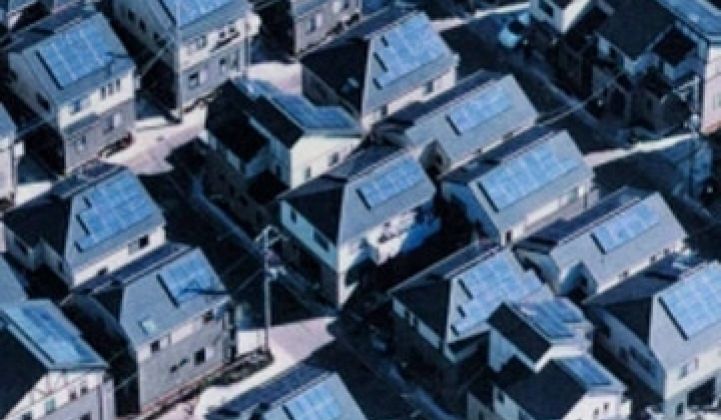Greentech Media provides extensive coverage of the remarkable advances in solar technology. Here's a small selection:
IBM's recent solar breakthrough
Research at Stanford
Solar efficiency
CIGS and Solyndra
Prospects for amorphous silicon
Concentrating PV update
And the GTM Research team provides insightful analysis and forecasts in the solar sector:
Next Generation Solar Cells CPV Technology and Market Analysis
But overcoming obstacles to getting solar technology on residential roofs is not so much a technical issue, but a financial one.
Yes, technology advancements and economies of scale are driving down the price of solar. Certainly the cost of solar panels has plummeted dramatically in the last few years, and talk of "grid parity" in solar pricing is realistic in certain regions.
But solar's upfront cost remains prohibitively expensive for most homeowners. A residential solar system can cost $20,000 to $50,000, even with generous subsidies. It's like paying your electric bill for the next 20 to 30 years in advance. And if you move or sell the house, what happens to the panels? Do you take them with you? Can you get meaningful value for them from the new owner?
But now there are financing tools that can eliminate the large up-front cost as well as the maintenance and hassle issues for consumers. And they are here today.
The PACE program allows residents and small businesses to borrow money to finance solar, energy efficiency or water-saving improvements and pay the money back over 20 years via their property taxes, whereas firms like SolarCity and SunRun provide residential leasing options, a.k.a. Power Purchase Agreements (PPAs).
On Wednesday, I spoke with Lynn Jurich, the President of SunRun, about getting solar on residential roofs.
SunRun is a home solar service company located in San Francisco, California that offers residential PPAs. SunRun refers to the residential PPA as "home solar as a monthly service," and is currently dedicated to making solar power affordable and accessible in California, Arizona, Massachusetts, and New Jersey.
Jurich said, "Zero up-front cost is the key to the solar adoption."
"What we've noticed is that there is a nice complement between what we're doing and the PACE program," said Jurich. She added that the PACE program can address energy efficiency issues like insulation and water, while the SunRun PPA can get PV panels on the roof.
The PACE program allows customer ownership of the solar system. And ownership means responsibility for monitoring the installation and replacing broken parts and failed inverters. On the other hand, the SunRun PPA model provides an 18- to 20-year warranty and handles all replacement issues.
According to Jurich, a major barrier to consumer adoption is developing trust with a program. For example, even with equal financing terms, if a local government endorses a particular program, the take rate is 10 times that of the non-endorsed program. Jurich mentioned that an Orange County, California supervisor wants to offer the PACE program, but wants to make people aware of the PPA option, as well.
Business is good for SunRun. Jurich said that she's seen 8 to 10 times growth over last year, even in the traditionallly slow winter months. In her words, "there's a ton of business."
And importantly, SunRun and Jurich see another benefit of their service as creating real jobs working with local solar contractors. Solar contractors will add more than 1,000 jobs in 2010 as a result of the SunRun PPA program, according to SunRun's president.
SunRun's major competitor in the residential PPA sector is SolarCity. Jurich claimed that SunRun is doing approximately triple the volume of SolarCity in terms of numbers of reservations, as per California Solar Initiative data.
Then Jurich put it in starker terms: "Utilities are our main competitor, along with people who are doing nothing."
Sunrun has received venture funding from Foundation Capital and Accel Partners, as well as a $105 million tax equity commitment from an affiliate of U.S. Bancorp.



